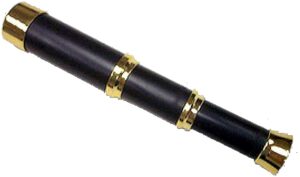Over 20-plus years of teaching and coaching leadership, I have increasingly come to love and strive for simplicity. And today I offer three tools that a leader always has at their disposal.
 . Aim the telescope. The telescope points to destination or, in leadership lingo, vision. Help people see clearly through it to where we are going. Sometimes you describe it. These are the words of the visionary leader, the “I have a dream…” or the “We won’t let anyone tell us that we can’t create X, Y and Z?” This also may be a nearer-in-point of focus on the telescope, like saying: “We’re going to get this prototype to the client by Monday!” This motivation through the scope releases energy and focuses action.
. Aim the telescope. The telescope points to destination or, in leadership lingo, vision. Help people see clearly through it to where we are going. Sometimes you describe it. These are the words of the visionary leader, the “I have a dream…” or the “We won’t let anyone tell us that we can’t create X, Y and Z?” This also may be a nearer-in-point of focus on the telescope, like saying: “We’re going to get this prototype to the client by Monday!” This motivation through the scope releases energy and focuses action.
It’s not always about speaking about what you see through the scope. You can always ask about vision-of-success. There are two unique aspects to asking others to look through the telescope. First, it lets anyone be a visionary. A CEO or school principal can talk vision any time she wants. But what about an assistant, a team member, or even an intern? They can always ask, “I’m sorry, exactly what are we trying to achieve?” Or, “Does that outcome get us what we really want?” Keep your telescope near at hand!
 2. Ask about gratitude. THE biggest research development in the 20 years I have been doing organizational and interpersonal leadership work is the powerful proof of the impact of positivity. Barbara Frederickson, Professor of Psychology at the University of North Carolina and the team led by Professors Baker, Dutton and Cameron at University of Michigan’s Center for Positive Organizations have documented powerful linkages between positivity and things like creativity, confidence and collaboration.
2. Ask about gratitude. THE biggest research development in the 20 years I have been doing organizational and interpersonal leadership work is the powerful proof of the impact of positivity. Barbara Frederickson, Professor of Psychology at the University of North Carolina and the team led by Professors Baker, Dutton and Cameron at University of Michigan’s Center for Positive Organizations have documented powerful linkages between positivity and things like creativity, confidence and collaboration.
I now start every meeting with gratitude. Typically, we do it in 2’s, one or two minutes apiece. We share a spontaneous object of our gratitude, and then we share one about each other and/or the work . This concise exercise helps us forget all the distractions we brought in, and open a positive frame moving forward. It’s not Polyanna. It, in fact, helps us most when we have hard work, or even issues between us. I cannot recommend it strongly enough.
3.  Bring ignorance. This could also be expressed as: gain wisdom. Wisdom grows from “not knowing.” Yet, we’ve almost all been taught to show how fast we are, how much we know, how smart (not wise) we are…and to prove that we’re not “dumb.” Of course, this churning mental force operates at a deep level of our subconscious. But, if we can counter-intuitively turn from knowing to not knowing, we achieve powerful effects. This is true, especially in these circumstances: when problems are complex, when people have strong differences, or when someone has ambivalence. Great questions that come from “not knowing” are what help unlock whole new insights, clear up confusion, and reveal hidden assumptions. Kind and caring listening also builds powerful trust – perhaps a leader’s greatest relational asset.
Bring ignorance. This could also be expressed as: gain wisdom. Wisdom grows from “not knowing.” Yet, we’ve almost all been taught to show how fast we are, how much we know, how smart (not wise) we are…and to prove that we’re not “dumb.” Of course, this churning mental force operates at a deep level of our subconscious. But, if we can counter-intuitively turn from knowing to not knowing, we achieve powerful effects. This is true, especially in these circumstances: when problems are complex, when people have strong differences, or when someone has ambivalence. Great questions that come from “not knowing” are what help unlock whole new insights, clear up confusion, and reveal hidden assumptions. Kind and caring listening also builds powerful trust – perhaps a leader’s greatest relational asset.
Put ‘em in your pocket and
Lead with your best self.

A year ago I created, researched and led 8 gratitude journal-writing workshops. It’s been wonderful to experience vicariously the benefits people have during these 1 hour sessions.
There are so many ways to approach the practice of conscious gratitude. Daily or spontaneous reflection, writing on a calendar or in a journal, sharing at a meeting as Dan describes or over dinner with family or friends.